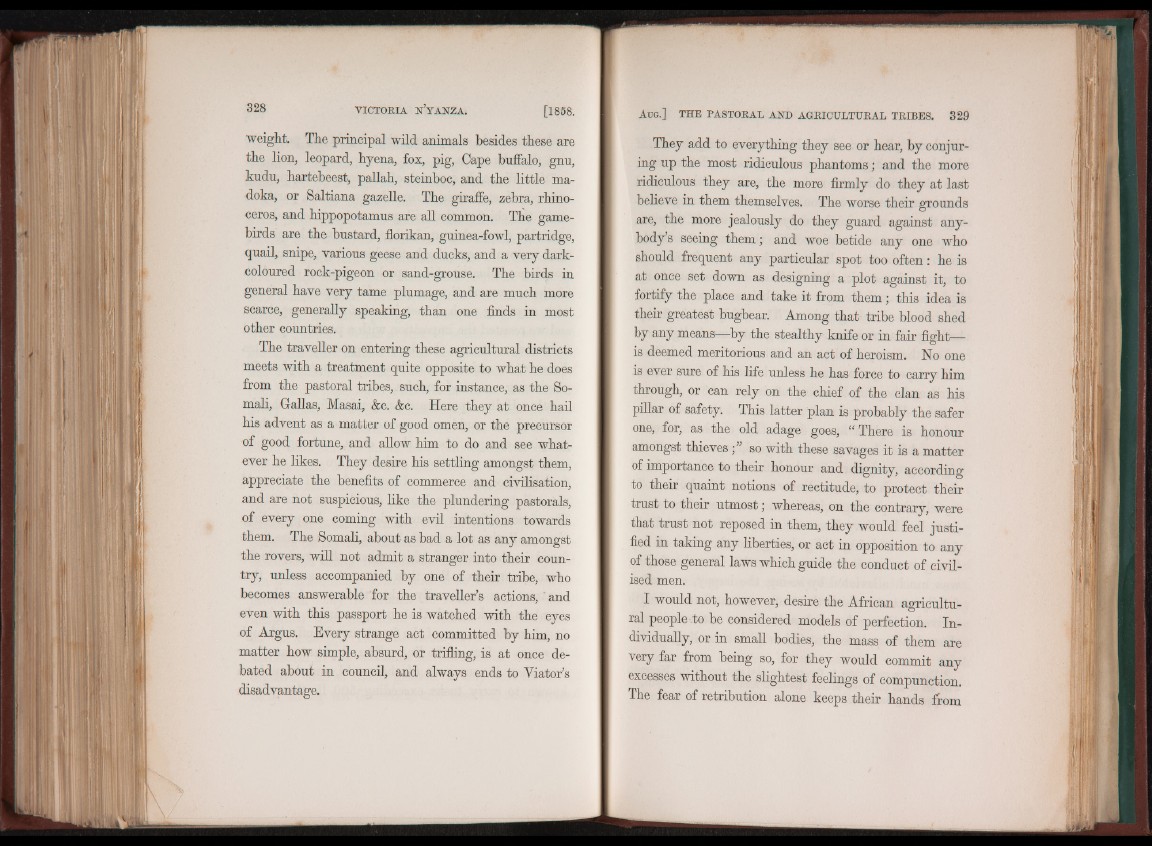
weight. The principal wild animals besides these are
the lion, leopard, hyena, fox, pig, Cape buffalo, gnu,
kudu, hartebeest, pallah, steinboc, and the little ma-
doka, or Saltiana gazelle. The giraffe, zebra, rhinoceros,
and hippopotamus are all common. The gamebirds
are the bustard, florikan, guinea-fowl, partridge,
quail, snipe, various geese and ducks, and a very dark-
coloured rock-pigeon or sand-grouse. The birds in
general have very tame plumage, and are much more
scarce, generally speaking, than one finds in most
other countries.
The traveller on entering these agricultural districts
meets with a treatment quite opposite to what he does
from the pastoral tribes, such, for instance, as the Somali,
Gallas, Masai, &c. &c. Here they at once hail
his advent as a matter of good omen, or the precursor
of good fortune, and allow him to do and see whatever
he likes. They desire his settling amongst them,
appreciate the benefits of commerce and civilisation,
and are not suspicious, like the plundering pastorals,
of every one coming with evil intentions towards
them. The Somali, about as bad a lot as any amongst
the rovers, will not admit a stranger into their country,
unless accompanied by one of their tribe, who
becomes answerable for the traveller’s actions, ' and
even with this passport he is watched with the eyes
of Argus. Every strange act committed by him, no
matter how simple, absurd, or trifling, is at once debated
about in council, and always ends to Viator’s
disadvantage.
They add to everything they see or hear, by conjuring
up the most ridiculous phantoms; and the more
ridiculous they are, the more firmly do they at last
believe in them themselves. The worse their grounds
are, the more jealously do they guard against any-
body’s seeing them; and woe betide any one who
should frequent any particular spot too often: he is
at once set down as designing a plot against it, to
fortify the place and take it from them; this idea is
their greatest bugbear. Among that tribe blood shed
fy any means—by the stealthy knife or in fair fight—
is deemed meritorious and an act of heroism. No one
is ever sure of his life unless he has force to carry him
through, or can rely on the chief of the clan as his
pillar of safety. This latter plan is probably the safer
one, for, as the old adage goes, “ There is honour
amongst thieves; so with these savages it is a matter
of importance to their honour and dignity, according
to their quaint notions of rectitude, to protect their
trust to their utmost j whereas, on the contrary, were
that trust not reposed in them, they would feel justified
in taking any liberties, or act in opposition to any
of those general laws which guide the conduct of civilised
men.
I would not, however, desire the African agricultural
people to be considered models of perfection. Individually,
or in small bodies, the mass of them are
very far from being so, for they would commit any
excesses without the slightest feelings of compunction.
The fear of retribution alone keeps their hands from